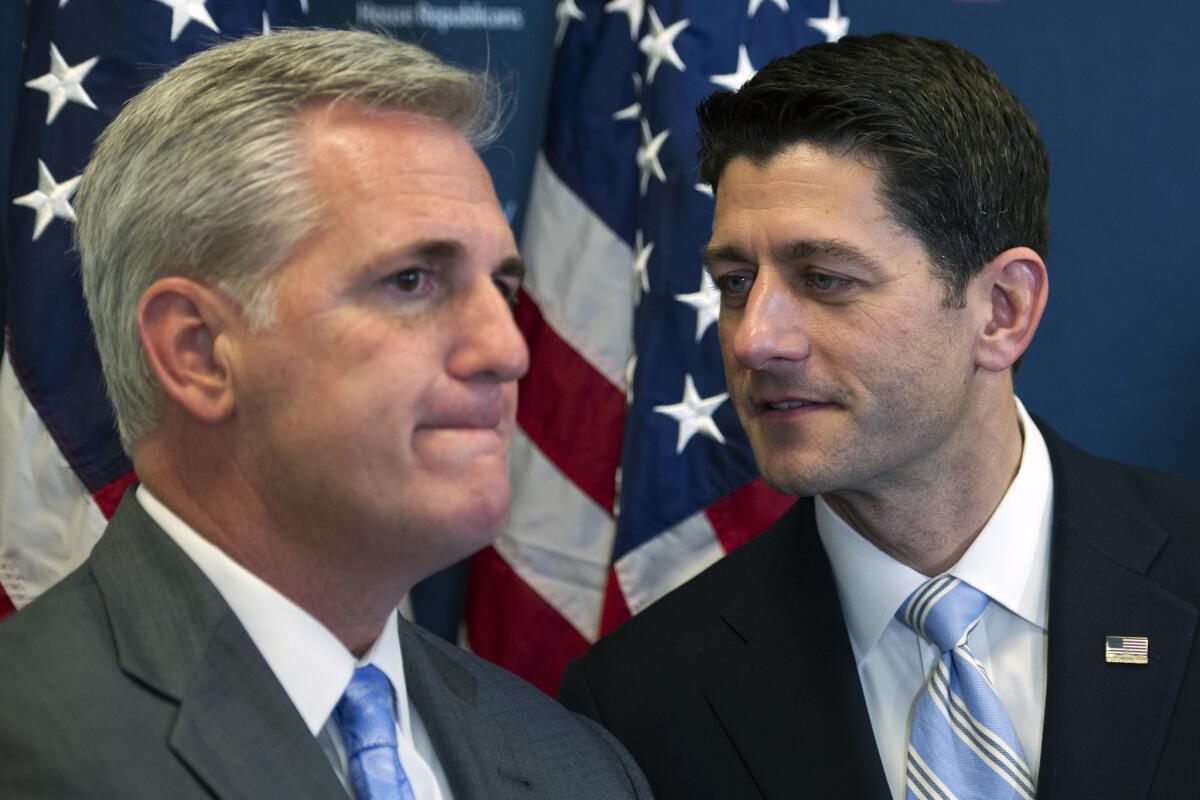GOP congressional leaders struggle to balance Republican principles in Trump era

GOP leaders are coming to grips with what’s likely to be a complex, at times tortured, relationship with the Trump White House as they balance long-held Republican principles with a desire to avoid direct confrontation with the new president.
Republicans know Donald Trump is no traditional Republican. And privately many conservatives have frowned at his threatened 35% tariff on certain imports and his intervention to pressure Carrier Corp. not to move factory jobs to Mexico.
But they also want to maintain party unity and a strong relationship with the president-elect, lest they end up a target of Trump’s hostile tweets, as happened before the election to House Speaker Paul D. Ryan of Wisconsin.
Scope of Donald Trump’s falsehoods unprecedented for presidential candidate. »
House Majority Leader Kevin McCarthy found Monday just how hard it can be to walk that line.
The No. 2 House Republican tiptoed around repeated questions over Trump’s trade policies — seen as at odds with longtime GOP positions on free markets — before finally suggesting with exasperation that the president-elect’s proclamations should not be taken too literally since he’s not yet in the White House.
“Take a deep breath. He’s not sworn in yet,” McCarthy told reporters at his weekly off-camera briefing. “Let’s not predetermine what the outcome of this stuff is.”
On big-ticket items like deficit spending, infrastructure investment and entitlement reforms, the president-elect is testing how far Republicans in Congress are willing to drift from the limited government, fiscally-conservative principles that have defined the modern GOP.
Even when Trump and Capitol Hill Republicans agree in broad strokes — for example, on corporate tax cuts — they differ on the details.
Ryan noted Sunday on CBS’ “60 Minutes” that Republicans in the House wanted to lower the corporate rate to 20%, while Trump’s plan pushes it down to 15%.
And neither Trump nor Republicans in Congress have produced a legislative proposal for replacing the Affordable Care Act, foreshadowing the difficult negotiations ahead. Ryan did not dispute Sunday that full repeal and replacement of Obamacare could be another three years in the making.
“Still working on that,” Ryan said.
But Trump’s skeptical attitude toward trade, a signature campaign issue that appealed to Rust Belt and working-class white voters who blame globalization for American job losses, entangled McCarthy on Monday when he was asked about Trump’s threat to impose a 35% tariff on imported goods from U.S. companies that move factories abroad.
This is Bernie Sanders’ plan to lead Democrats out of the wilderness. »
“I think the point that the president-elect was trying to make is, you want to create jobs in America. Today the best way to make that change is through tax reform,” McCarthy said.
“I don’t want to get into some kind of trade war,” he added, referring to warnings that increased U.S. tariffs would lead other countries to follow suit.
So Republicans have no intention of approving a 35% tariff, he was asked?
“Our intention is to have tax reform that encourages companies to be in America,” McCarthy deflected.
And if the White House sends a tariff bill to Capitol Hill?
“Let’s have the debate and see where it ends up,” McCarthy said.
In between there were questions about whether the party of Ronald Reagan — a hero to conservatives — had lost its way.
But McCarthy, who keeps portraits of both Reagan and President Lincoln in his Capitol office, insisted he remained a believer in free markets and conservative ideals.
Asked whether it was appropriate for the president-elect to intervene in a business decision such as Carrier’s, McCarthy was careful not to cross Trump.
“I think a president wants to get involved any time it’s about jobs being created in America,” McCarthy said. Carrier, a heating and cooling company, was reportedly given $7 million in state tax breaks to keep about 800 jobs in Indiana.
How many jobs merit a U.S. president’s attention? Fifty? A hundred? A thousand? Reporters also pressed on whether the Carrier deal is an example of the kind of “crony capitalism” that Republicans have railed against, as they did when President Obama sent federal funds to the green-energy firm Solyndra?
McCarthy dismissed such complaints as politically motivated. “I usually think ‘crony capitalism’ is when something somebody disagrees with, they use the term.”
“I don’t want to break news here,” McCarthy said as the session approached its end, “but people will have differences of opinion.”
Twitter: @LisaMascaro
ALSO
Despite talk of GOP unity, Trump’s programs face fight from Republican budget hawks
‘Believe me’: People say Trump’s language is affecting political discourse ‘bigly’
Trump’s rise draws white supremacists into political mainstream: ‘I am winning,’ says David Duke
Live coverage from the campaign trail
More to Read
Start your day right
Sign up for Essential California for news, features and recommendations from the L.A. Times and beyond in your inbox six days a week.
You may occasionally receive promotional content from the Los Angeles Times.







